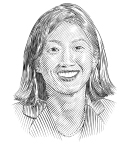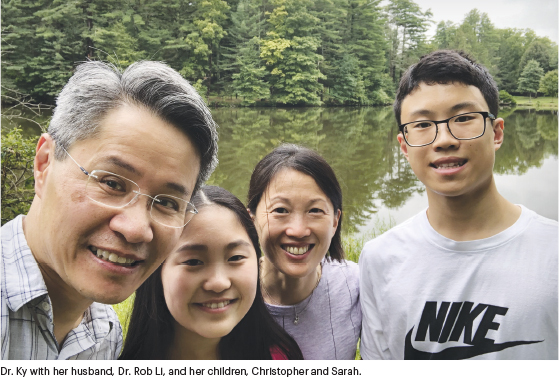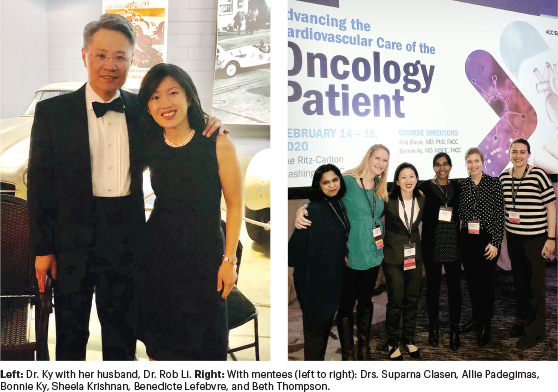Cardio-oncology focuses on the detection, monitoring, and treatment of cardiovascular disease occurring secondary to cancer treatment, and the mechanistic and epidemiologic intersection between cardiovascular disease and cancer. With the advent of targeted agents and immunotherapies, cardio-oncologic interventions have become a vital part of the cancer care continuum. One of the leaders in this emerging field is Bonnie Ky, MD, MSCE, FACC, Director of the Penn Cardio-Oncology Translational Center of Excellence.
Simple Credos
Dr. Ky was born in Queens, a borough of New York City that is considered one of the most ethnically diverse urban areas in the world. At age 5, Dr. Ky’s parents relocated to a suburb in northern New Jersey. “My parents were immigrants from Taiwan, and they came to the United States in their early 20s with very little. They uprooted themselves from their home and ventured to a new land determined to pursue higher education and greater opportunities. They both came from very large families—each had 10 siblings—so family was the center of their worldview. They instilled certain foundational principles in me that have helped me through life. In essence, these were simple mantras: unconditional love of family, a tireless work ethic, and empathy and caring for those around you,” said Dr. Ky.
Bonnie Ky, MD, MSCE, FACC

TITLE
Director, Penn Cardio-Oncology Translational Center for Excellence; Director, Penn Center for Quantitative Echocardiography; and Founders Associate Professor of Cardio-Oncology
MEDICAL DEGREE
MD, University of Pennsylvania School of Medicine
ON HER PARENTS’ LASTING INFLUENCE
“Although my parents did not pursue careers in medicine, their values about work and life had a large influence on my decision to become a physician. Many of the values they instilled in me, such as empathy, great dedication, and a tireless effort to solving problems at hand, can be translated directly into the medical profession. My parents are still my greatest role models.”
She continued: “Although my parents did not pursue careers in medicine, their values about work and life had a large influence on my decision to become a physician. Many of the values they instilled in me, such as empathy, great dedication, and a tireless effort to solving problems at hand, can be translated directly into the medical profession. My parents are still my greatest role models.”
During high school, Dr. Ky was drawn to math and the sciences. “I loved math because it made sense to me; it allowed me to think quantitatively and concretely. I also found a lot of beauty in biology, and at how the human body works as an integrated system. Although I had not decided on a career in medicine while in high school, I knew I wanted a career in the sciences,” said Dr. Ky.
Questions and Answers
In 1991, Dr. Ky went to the Massachusetts Institute of Technology (MIT) to pursue an MS in chemical engineering. “I loved the rigor at MIT, and early on, I fell in love with research and the process of asking questions and finding answers using the tools and knowledge I had at hand. MIT also taught me how to break down complex problems into component parts and systematically and creatively look for solutions. Being around such bright and driven people motivated me to keep pushing the intellectual envelope,” she reflected.
While at MIT, although her love for the sciences increased, Dr. Ky was unsure of whether to pursue a PhD, MD, or MD/PhD. “I worked at Merck for 2 years in bioprocess research and development as an engineer and was happy to find an environment where there were quite a few MIT transplants among my colleagues. Although I found the time at Merck intellectually stimulating, I eventually wanted a career that offered one-on-one human interaction and the opportunity to directly help people. I decided that the best way for me to satisfy my love for science and problem-solving, while at the same time making a difference on a human level, was to go into medicine,” said Dr. Ky.
A Valued Mentor
Having decided on a career in medicine, Dr. Ky entered the University of Pennsylvania Medical School in 1997. “Early on as a medical student, I was considering whether to pursue a career in surgery or cardiology. I loved surgery because it was a discipline that satisfied my desire to solve problems and fix things. There was also a hands-on immediacy about surgery that I was drawn to. But I ultimately fell in love with cardiology during the didactics session, which was solidified during a third-year rotation in the cardiac catheterization lab. I have to credit John Hirshfeld, MD, for introducing me to the full breadth and complexity of cardiology. I found there was also a lot of overlap between cardiology and engineering, and I loved the quantitative aspects as well as the depth and breadth of research the field offered,” said Dr. Ky.
Dr. Ky began her residency at the University of Pennsylvania Medical School in 2001, a time she described as a great period of professional and personal growth. “Most of my residency was focused on patient care, as it was an intense time, filled with a lot of learning as well as long days and nights with critically ill patients. Mariell Jessup, MD, was a tremendous clinician role model for me during that very busy time. She has excellent clinical acumen and continues to be a strong female role model.”

“During fellowship, I struggled with the decision over whether to follow a career and training path focused primarily on clinical care or research, as well as what type of research I wanted to pursue. Three mentors stand out to me during that time as particularly influential. Tom Cappola, MD; Steve Kimmel, MD; and Martin St. John Sutton, MBBS, encouraged and challenged me to push forward. I decided to pursue dedicated, focused training in research, which was true to my desire to ask and answer questions, solve problems, and have a positive impact,” said Dr. Ky. “I’ve been at Penn for more than 20 years and I’ve completed all my postgraduate training here, including a master’s degree in clinical epidemiology. Penn has offered me everything I need to advance my career and better serve our patient population.The Abramson Cancer Center and Cardiovascular Institute and Divisions of Hematology/Oncology and Cardiology have each been tremendously supportive. I am very fortunate to work alongside highly invested and intelligent collaborators and patients.”
Multiple Hats
Dr. Ky is currently a tenured Associate Professor of Medicine and holds the Founders Associate Professorship in Cardio-Oncology. Recently, Joan Thalheimer, a philanthropist, gave a large gift to Penn, which enabled Dr. Ky’s endowed professorship and strengthened cardio-oncology. “I also direct the Penn Cardio-Oncology Translational Center of Excellence and the Penn Center for Quantitative Echocardiography. I am the inaugural Editor-in-Chief of JACC: CardioOncology. I am excited by being at the helm of this terrific journal. Our goal is to publish science that is impactful, informative, and meticulously executed. Our editorial board is driven by these standards of excellence and rigor. My earnest desire is that we advance the care and improve clinical outcomes of the growing population of cancer patients and survivors,” said Dr. Ky.
Along with her many hats, Dr. Ky also serves as Cardiotoxicity Subcommittee Chair within ECOG-ACRIN. “Both JACC Journals and the ECOG-ACRIN research group have been wonderful academic homes for me, and I’m so extraordinarily grateful to have this great family of colleagues and collaborators who are leaders in oncology and cardiology and who are kind, accessible, supportive, and inspiring. Some colleagues who are particularly notable are Lynne Wagner, PhD; Angie DeMichele, MD, MSCE; Naomi Haas, MD; Valentin Fuster, MD, PhD; Doug Mann, MD; Saro Armenian, DO, MPH; Greg Armstrong, MD; and Dan Lenihan, MD,” said Dr. Ky.
Asked about her current research, Dr. Ky replied: “My National Institutes of Health– and American Heart Association–funded clinical translational research program in cardio-oncology is founded in the premise that ‘Cardiotoxicity is detectable, treatable, and preventable.’ Our goals are to better understand the cardiovascular disease phenotype in our patients with cancer, so we can mitigate cardiovascular risk and improve their lives. Along with research, my ambulatory clinic is focused entirely on cardio-oncology.My patients constantly inspire me.”
Big Picture
Asked for a big-picture observation, Dr. Ky said: “Each day is filled with gratitude and humility. I am always learning. My patients motivate me by their extraordinary courage. I love the opportunity to care for them and have that one-on-one impact. But I also highly value the opportunity to make a difference on a much broader level through my research. I am driven to improve the cardiovascular care of our patients with cancer and survivors through research, education, and high-value clinical care.”
Dr. Ky noted that cardiovascular disease is a leading cause of morbidity and mortality in cancer survivors. “I hope we can continue to advance the cardiovascular care of patients with cancer and make important and tangible contributions to improving the quality and quantity of life for this growing population, by creating partnerships and multidisciplinary collaborations, through research, dissemination of education, and through building the community,” said Dr. Ky.

How does a super-busy cardio-oncologist decompress? “Life is very busy, but there are a number of critical things that help me maintain balance. My major interests and passions are family. I am married to an interventional cardiologist, Robert Li, MD, FACC, and we have two great teenagers, who are very busy themselves with music—playing multiple instruments, sports, writing, theater, art, and school. Being a mother has taught me so much about life. When faced with my own questions, I often think, what advice would I give my child if he or she was asking me the same thing? My faith and prayer are also central to my life. I also love running and run every day. It’s a great time to clear my head and just think, without distractions. Often, great ideas come to me during my daily 1-hour run!”

